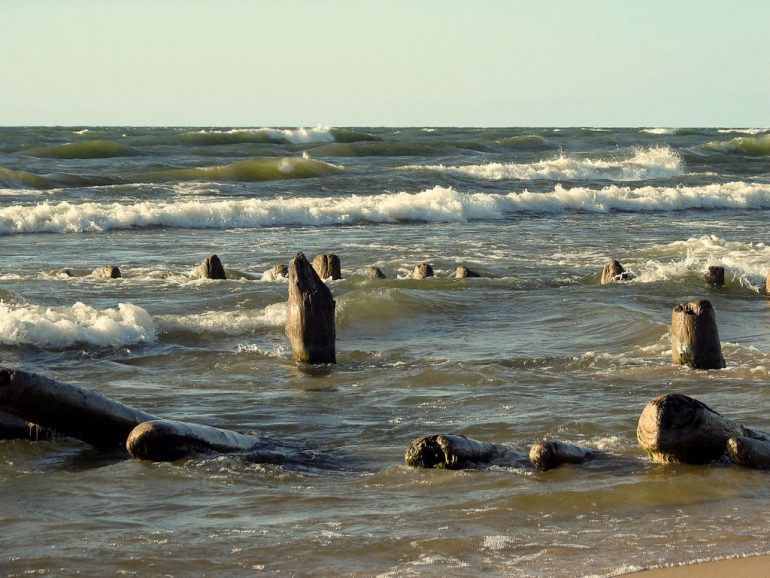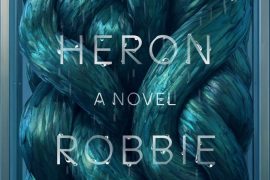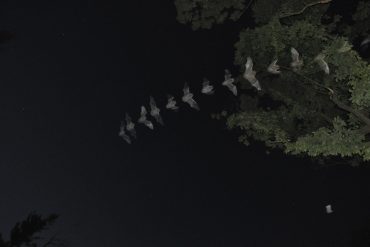Having purchased the t-shirt from a thrift store downtown, Laura did not notice the stain on its front until the next day, when she sat across from her boyfriend at a little wooden dining table in her kitchen. His jaw crunched loudly on spoonful by spoonful of his favorite cereal. He did not care that somebody told him that brand of cereal contains pencil shavings as an ingredient. Laura’s own chair creaked as she sat in it, but aside from that, the only other noise was the kettle as it began to boil. A single sunflower peaked out of a skinny bottle-turned-vase in the center of the table. It pointed toward the morning coming in through the window to her right.
“What does this look like?” she asked her boyfriend, gesturing to the t-shirt’s large stain.
He looked up at her and shrugged.
“It looks like Jesus,” she continued. “His face, a little bit. A lot, actually. I can’t stop looking at it.”
“Is that a coffee stain?”
“I mean, it’s not very clear, but you can make out his features all right.”
“It could be sauce, too,” said her boyfriend. “It looks edible.”
She stared down at her shirt for a moment, as though she had just pulled it off the rack and was waiting to see how it made her feel. To see whether or not she should keep it.
“Do you know how to wash something without getting the stain out?”
The boyfriend shook his head. “Probably by hand.”
***
As a tow truck made an illegal left at the intersection and clipped the front bumper of her car, Laura began to regret driving to work. She never really felt safe, driving. Not around here at least. Plus, she always felt this aching guilt regarding the constant flow of CO2 her vehicle projected into the atmosphere. But she felt that guilt about most things. The tow truck slid to a stop about five yards later, five yards after it had pulled her front end into the opposing lane, her neck and body swinging wildly with it. A car honked somewhere, she heard. Somebody stopped and said, “You OK?” to no one in particular. She got out, feeling slightly dazed. The truck driver was already there, standing beside her car and examining it like a mechanic.
“Heh,” he chuckled, placing two greasy hands on his belt loops, “You’re lucky it wasn’t someone else that hit you, if you need a tow, I mean. You’re lucky someone else didn’t try to turn that corner the way you were sticking out. But if you need a tow, it’s a good thing I’m around.”
Laura paid little attention to him as she ran her hand over a fractured portion of the front to her little sedan. His voice did not sound real. It sounded like his mouth was filled with cars instead of teeth. The material had cracked in four or five different places on her bumper, which jutted out sharply, but no serious damage was done.
“Did you spill, too?”
“Huh?” she looked up.
“On your shirt. There’s a big stain the shape of Italy.”
“It’s Jesus,” she replied angrily, before reentering her car and sidling it back into the right lane. A bump on the hood was insignificant, considering what could have happened. She only wanted to get away from there quickly. The tow truck driver disappeared in her rearview mirror, and she rubbed her sore neck as she drove off.
***
At Quartz Shores—the beach where she worked as a lifeguard—Laura took a large hat from the trunk of her car and placed it on her head. The sand was hot already, this early in the morning. But she slid off her shoes anyway and made her way from the parking lot to the lifeguard tower. Without a word to the eager beachgoers, who laid out towels and umbrellas and waited patiently for the flags to go up before letting their children swim in the Atlantic, she climbed the painted-white miniature stairway and slumped into her chair at the top.
It was a bright day, so the people dotting the tide grew fuzzy in her vision, fading slightly as they rose and fell with each smooth wave that passed through them like a ghost. Rising and falling—in the long line of people that stretched along the shallows, she imagined unity, some single motion of everything working together. A little like driving, but not like it at all. She began to doze off as she watched this. She pretended the waves were passing over her just as neatly and cleanly. An hour passed, and she took only four sips from her water bottle in that time. And then, the line broke apart, and the crowd of wading people reoriented itself into a single fixed spot. Laura squinted at the figures. Somebody shouted. But they were still too fuzzy to see. She almost could not make them out. They shouted, again, until Laura finally realized something terrible was happening.
Jumping down from her tower, Laura sprinted to the conglomerate of people and said, “Move aside, clear the way. What’s going on?”
But the strangers did not really need to answer. There was a girl—eight or nine by the looks of it—lying on her back, coughing up water. Somebody was in the process of resuscitating her. Successfully, it seemed. Because for a moment, the seawater shot straight upward in three beautiful spouts from the girl’s throat like the Bellagio Fountains. The crowd stood back, watched in awe, waiting for the horrible show to end. When the girl finished, they all sighed in relief to see her sit up and look confusedly around. A few people applauded the scene.
Laura’s heart raced—there was that guilt again, that never-ending guilt. She knelt beside the girl, placing a hand on her forehead. Ashamed, Laura frantically repeated, “Are you in pain? Let me feel your pulse. How do you feel?” As she leaned down, she could not help but notice how her shirt drooped toward the suffering girl and how the face of Jesus seemed to be closing in. Somehow involved and interested. They both resembled each other, the faces—both in some air of paused suffering. Laura wondered, for a moment, if the girl needed to touch her shirt, if she still needed to be healed somehow. But then came the frantic voice of the girl’s father over the crowded commotion.
“What happened back there?” he shouted.
Laura looked up.
“Yes, I’m talking to you, idiot,” continued the man, “Aren’t you supposed to be some sort of lifeguard? Isn’t keeping something like this from happening your only job?”
He was speaking loudly and angrily, as though both of those together could evaporate his still-present tears.
“I,” she began, “I’m sorry. I wasn’t—”
“Don’t,” said the father, taking his daughter by the arm and trying to lead her away, “We’re leaving.”
“Wait,” Laura continued frantically, tears beginning down her own cheek, “Stay. For a moment. The girl, she just needs to touch my shirt. She just needs to touch the face of Jesus.”
A new silence filled the air. People in bathing suits looked at each other, looked at her. The girl even glanced back, hearing this. But she was led away quickly. An older woman nearby frowned and shook her head. She approached the lifeguard and said, “I think you should take a break.”
“This is—this is important. Can’t you see how important this is?”
The older woman shook her head again. The father had rushed his daughter back to their things, and they were escaping by the showers.
“Just let the girl go,” said the woman. “Let it go. Just take a break, have a bit of rest.”
Kindly, she led Laura out of the crowd and back to the tower. The line of golden sand stretching north and south along the coast grew fuzzier in the sunlight. It was almost unbearable, the sunlight—the way it turned everything into a wave of haze and incomprehension. How, Laura wondered, could anyone see anything at that moment?
***
Two hours had passed. Most of the people who had witnessed the earlier scene had filtered out by now and were replaced by a new crowd. Laura leaned lazily against her hand, propped steadily in the nook of her lifeguard tower’s wooden throne. The shore hissed and hummed its usual tune, until it was interrupted suddenly by a voice quite close to her left.
“You’ve got to take that shirt off,” said a man.
She glanced down at him. The stranger stood in the shade of her tower—his head level with her feet—and gazed up at her as he spoke. He had on no shirt and his swimming trunks appeared damp from the ocean.
“Huh?”
“If you want to work on your tan.” The man smirked unpleasantly. “It’s the beach, isn’t it? You don’t want clothing getting in between you and the sun. Show some skin. Relax. You know, get more comfortable.”
“Not that,” she said, suddenly sitting up, “Tell me the original thing you said. The first thing. What did you say?”
The man’s expression faltered. “I, um, said you should take that shirt off.”
A family nearby was watching the interaction. And a guy in sunglasses called over, “Get away from her. You’re being creepy.”
The man ignored this.
“Come on, dude. Stop it. Leave her be,” said another from the family.
It took a moment for the man to finally leave. Seeing the attention he was getting—and the lack of any reaction from the lifeguard—he strode off down the beach toward the ocean. Laura was staring at the sand, distracted, fiddling with a bundle of her shirt. Between thumb and forefinger, she kept turning it and turning it. Something was gnawing at her insides, something tide-like. It could have been just that, some piece of the tide. Or the waves which swept through people like ghosts. The stain drifting softly like sargassum. She watched it for a long time, the ocean. Until she didn’t.
Quickly getting to her feet, Laura clambered off the short tower, sand spraying across towels and nearby people as she landed, and began rushing toward the parking lot. Her bare feet smacked against the pavement as the line of sand receded, and upon reaching the spot where she parked her partially crushed sedan, Laura climbed inside. Cluttered in the little space, she pulled the t-shirt off over her back, and for a moment, stared down at the bundle in her hands—then she stuffed it into her mouth. At once, she devoured it.





